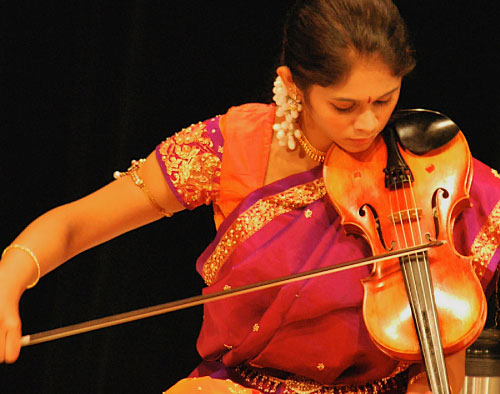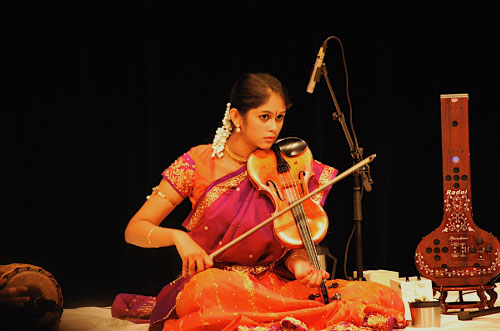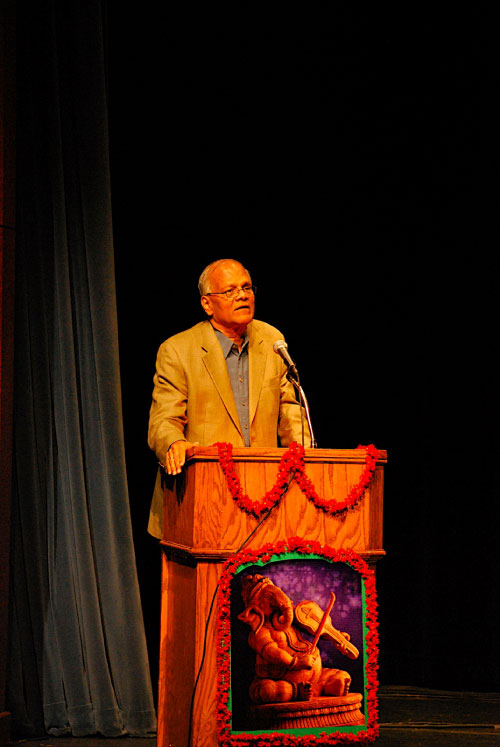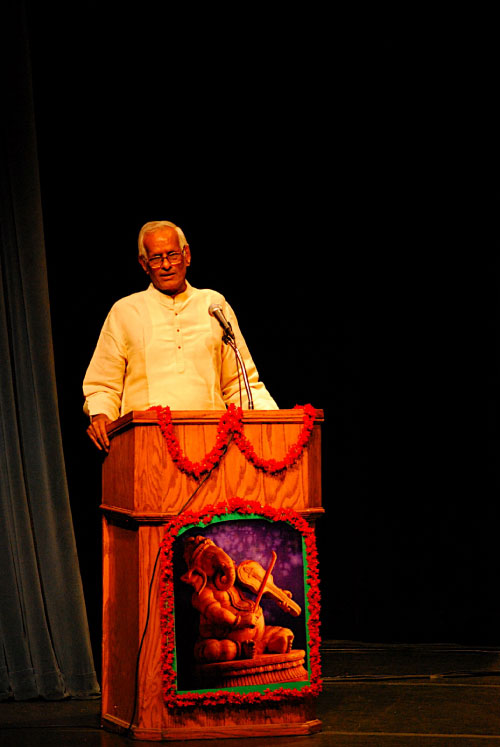Contribute
| Arangetram - Carnatic Violin: Rasika Murali |
Sunanda Narayanan
10/15/2009
It is not often that one attends a music recital that lingers in the memory and haunts the thoughts for days after. It is even more surprising when this is the happy outcome of an “Arangetramâ€! Rasika Murali’s violin arangetram at the Regis College auditorium on October 3rd 2009 was such an experience. This teenager with prodigious talent held her overflowing audience in thrall for well over four hours, not with just her mastery over instrument and technique, but with her soul-stirring, emotion-laden music that drew a tear from many an eye. The bar was set high for Rasika’s performance given her rigorous training with inimitable Guru Tara Anand and with mellifluous musician/teacher Geetha Murali as mother. That said, Rasika simply soared above all expectations that her Guru, parents, and audience had, with her peerless performance.
Special kudos to Guru Tara Anand and Rasika for concert planning. The selection of pieces included a variety of composers, ragas, talas, deities, and genres, while showcasing Rasika’s virtuosity and innate talent. She commenced with the timeless and grand Ata-tala varnam “Viriboni†in Bhairavi. The heavy gamakas in the varnam came through with quiet assurance and the mood for the concert was established effortlessly by the end of this opening piece itself. A brisk “Vatapi Ganapatim†followed with dazzling Hamsadhwani phrases that flew like musical darts off Rasika’s nimble fingers. Syama Sastri’s lilting “Marivere Gati Evaramma†in Ananda Bhairavi and Misra Chapu Talam featured next provided a suitable contrast with its slow and measured meter. Syama Sastri’s compositions can create an emotional climax for the performer and in turn the audience because they are vested with ardent adoration and deep devotion to the Mother Goddess in her many manifestations. The unhurried handling of this piece with the emphasis Rasika placed on the intensely moving lyrics was remarkable. That Rasika had been trained with a sound knowledge of these lyrics was revealed from the way she planned her pauses between words. The percussion support from mridangist Rohan Krishnamurthy and kanjira-artist Akshay Anantapadmanabhan beautifully embellished this piece while remaining unobtrusive, a testament to their maturity as performers.
When Rasika began Tyagaraja’s masterpiece “Durmagachara†in Ranjani raga, there was palpable joy in the auditorium. Ranjani is an audience pleaser, but more so when it is rendered with smooth transitions between the notes that I understand are a challenge to a violinist given the choppy scale of the raga. Rasika’s Ranjani flowed as a seamless melody even as the audience swayed in appreciation. “Niravathi Sukha†in Ravichandrika swept by at lightning speed with flourishes and brighas that emanated with precision and every note in place.
The stage was set for the main raga of the evening, Keeravani. Rasika delved into the treasure house that is Keeravani and came up with gems both traditional and unexpected in her elaborate raga alapana. The raga unfolded without pretension and with fidelity to the plaintive mood of the song to follow. When Rasika embarked on “Kaligiyunte†with no pause after the alapana, this listener suddenly became aware of the unrelenting demands of a solo violin concert where the onus is entirely on the lead musician to sustain the music whereas in a vocal concert they would take a break after a “manodharma†(extempore) passage for the support violinist to offer their response. The niraval at the “Bhaaguga Sri Raghu Raamuni Pada Mula…†line in the charanam commenced with Rasika first vocalizing the lyrics so that we felt the poignancy of the words. This was a lovely touch not often seen in instrumental concerts and that contributed immensely to our enjoyment of the exercise. The build-up was skillfully planned and executed, with technique taking a backseat to emotion - a pre-requisite for the niraval, which is the very quintessence of manodharma sangeetham. The kalpana swarams that ensued, showcased Rasika’s virtuosity as she effortlessly created beautiful swara permutations in two speeds, tisram, and culminated with a grand muthaippu. The tani avartanam by Rohan and Akshay was a wonderful percussion dialogue between these two well known US-grown artists.
After the weighty classicism of Keervani, came the flashy “Entanivina Vintura†in Urmika with its sprightly chittaiswaram. “Bhogeendra Sayinam†of Svati Tirunal in Kuntalavarali was a sweet bridge to the Ragam Tanam Pallavi (RTP) in Shanmukhapriya that was next on the list. The RTP in Khanda Jathi Triputa talam and Shanmukhapriya is a composition of eminent musician Suguna Purushothaman of Chennai, who is known to couch intricate laya in beautiful melody so that the listener is almost oblivious of the incredible demands the piece makes of a performer. Again, Rasika excelled in the alapana, offering many a choice phrase from this grand ragam, a favorite among nagaswara vidwans. The tanam was a dizzying build-up from a slow to a superfast tempo. Rasika’s beautiful singing voice was again revealed as she vocalized the lyrics of the pallavi before playing the traditional three speeds, tisram variation, and niraval with practiced ease. The highlight of this piece was the ragamalika kalpanaswara extravaganza where no less than fifteen different ragas were handled by this debutante with the confidence of a veteran. Each raga would commence with a phrase from a familiar song in that raga so that the audience was not left guessing its identity. Both weighty and light ragas were handled with aplomb and when Rasika culminated the exercise with a rapid fire cascade of the ragas played in reverse order, the awed audience rose instinctively to their feet in spontaneous appreciation.
The selection of tukkadas in the “lighter†ragas after the weightiness of the prior traditional fare on the concert menu kept the audience engaged. Bharatiyar’s classic “Chinnanchiru Kiliye†included some lovely sangatis in the opening line. Ghatam Karthick’s “medley†ragamalika piece was a foot-tapping melody drawn from nostalgia-evoking western and Indian tunes. What a custom-made piece for Rasika, given her involvement with both Carnatic and Western classical music genres! Even the many children in the theater who were a little fidgety at this point, stopped and listened during this piece. The song builds up to the reverberating “Jaya He†of the Jana Gana Mana anthem and Rasika kept the national fervor up with “Vaishnava Janatho†and “Raghupathi Raghavaâ€, perfect choices for the Gandhi Jayanthi weekend. She held the audience in the palm of her hand at this point and the happy crowd clapped along as the song escalated in speed and intensity. What more befitting finale to a violin arangetram than to play a composition of a violin maestro? Rasika rounded off the concert with Lalgudi Jayaraman’s vibrant Maund Tillana and the eternally classic Saurashtram mangalam of Tyagaraja that re-established the mood of devotion.
Wave after wave of applause emanated from the audience, many of whom were visibly moved and uplifted by the musical experience that Rasika drew them into. The speakers who felicitated Rasika, Guru Tara Anand, and the proud parents – Shri Gopalasundaram (Tamil scholar and music connoisseur), Shri Balasubramanian (father of the Carnatic duo Ranjani-Gayatri), and our own Ranjani Saigal were all wonderfully eloquent in their praise. Each touched upon different aspects of the concert – the technique, the emotion, the exacting training with Guru Tara Anand, the lineage, Rasika’s unswerving and tireless pursuit of perfection through hours of practice, and last but not the least, the ambience created by the stage and foyer décor. The parents, Geetha and Murali, were a picture of humility and gratitude when they offered a vote of thanks.
Rasika’s music is a rare blend of intellect and heart and having debuted as a seasoned rather than fledgling artist, the world is indeed her stage.
You may also access this article through our web-site http://www.lokvani.com/



